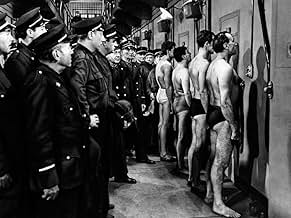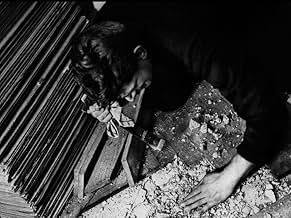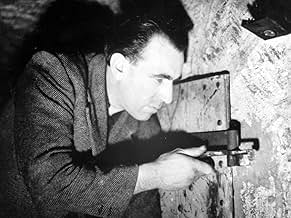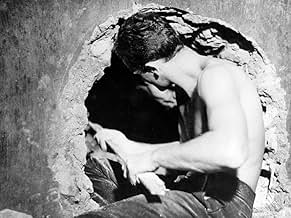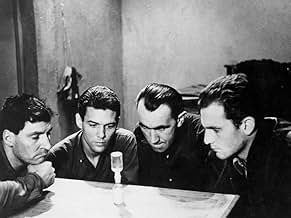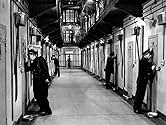CALIFICACIÓN DE IMDb
8.5/10
22 k
TU CALIFICACIÓN
En prisión, cuatro reclusos con largas sentencias que planean una fuga elaborada inducen cautelosamente a un nuevo recluso a unirse a su plan, lo que genera desconfianza e incertidumbre.En prisión, cuatro reclusos con largas sentencias que planean una fuga elaborada inducen cautelosamente a un nuevo recluso a unirse a su plan, lo que genera desconfianza e incertidumbre.En prisión, cuatro reclusos con largas sentencias que planean una fuga elaborada inducen cautelosamente a un nuevo recluso a unirse a su plan, lo que genera desconfianza e incertidumbre.
- Dirección
- Guionistas
- Elenco
- Nominada a2premios BAFTA
- 2 premios ganados y 4 nominaciones en total
Marc Michel
- Claude Gaspard
- (as Mark Michel)
Jean-Paul Coquelin
- Le lieutenant Grinval
- (as J. Paul Coquelin)
Albert Augier
- Un gardien
- (sin créditos)
Jean Becker
- Un gardien
- (sin créditos)
Mick Besson
- Deuxième plombier
- (sin créditos)
Georges Bielec
- Figurant
- (sin créditos)
Raymond Bour
- Un gardien
- (sin créditos)
Philippe Dumat
- Un gardien
- (sin créditos)
Gérard Hernandez
- Le détenu à l'infirmerie
- (sin créditos)
Jean Luisi
- Un détenu
- (sin créditos)
Opiniones destacadas
Before his life was cut short prematurely, Director Jacques Becker created his very personal film, "Le Trou" ("The Hole"). Using mostly then nonprofessional actors, M. Becker elicited extremely naturalistic and powerful performances in a reportedly true-life prison-escape drama set in France.
It was especially interesting to see Marc Michel in his film debut. Made four years before Michel scored a hit as Roland in "Les Parapluies de Cherbourg," Michel here subtely creates a fascinating character. His work is seemingly effortless, yet always intriguing. He stands at the center of a group of convicts planning a daring escape--a group which has difficulty in fully trusting his loyalty.
The routine of prison life as well as the actual escape is done with such detail that the viewer feels part of the action. The black-and-white photography enhances the realism of the presentation, done without a musical background.
Generally a "forgotten film," "Le Trou" is a carefully constructed prison drama, most convincingly executed. It is a credit to both a hard working cast and director.
It was especially interesting to see Marc Michel in his film debut. Made four years before Michel scored a hit as Roland in "Les Parapluies de Cherbourg," Michel here subtely creates a fascinating character. His work is seemingly effortless, yet always intriguing. He stands at the center of a group of convicts planning a daring escape--a group which has difficulty in fully trusting his loyalty.
The routine of prison life as well as the actual escape is done with such detail that the viewer feels part of the action. The black-and-white photography enhances the realism of the presentation, done without a musical background.
Generally a "forgotten film," "Le Trou" is a carefully constructed prison drama, most convincingly executed. It is a credit to both a hard working cast and director.
I watched this masterpiece first time before 10 years and I was stunned. Now, I watched it before few days again and I am really surprised how this remarkable movie functions and become better and better. It is really ingenious portrait of human interaction and cooperation, great "prison-escape" drama that bring us unique way of telling story (in long shots) looking so realistic and powerful.
One of the best movies I've ever seen!
10/10
One of the best movies I've ever seen!
10/10
Le Trou played on TV the other night, and thus gives me a chance to evaluate it after 20 years or so. The direction is magnificent: Becker was a genius at refining the elements of the story down to a bare minimum. Space is used well; the close-ups of men banging on concrete with improvised tools in a cramped space are very effective, they look like burrowing animals. Ghislain Cloquet was a master of black-and-white camerawork; he shot Mouchette and Au hasard, Balthazar for Bresson, Nuit et brouillard for Resnais, Le Feu follet for Malle, all great films made greater by Cloquet's work.
The endless dull routine enlivened by subterfuge--stealing materials needed for digging and making puppets to stand in for sleeping prisoners is brilliantly captured. If the prisoners are bored, so are the staff--the warden is desperate for some conversation with Gaspard, or with anybody. Geo's problem is a little hard to understand, I thought he'd want to go through with the plan. Otherwise I rate it very highly indeed.
The endless dull routine enlivened by subterfuge--stealing materials needed for digging and making puppets to stand in for sleeping prisoners is brilliantly captured. If the prisoners are bored, so are the staff--the warden is desperate for some conversation with Gaspard, or with anybody. Geo's problem is a little hard to understand, I thought he'd want to go through with the plan. Otherwise I rate it very highly indeed.
10pzanardo
Probably, to really get "Le Trou", this splendid, intense movie, you have to be conscious that the great Jacques Becker was dying during the making of the film. A quiet stoicism permeates this work of art. The story is supposed to be very sad, but it isn't. The guys on the screen are too tough, by no means apt to mourn their dire destiny or, metaphorically, to ask for the viewer's sympathy.
We have the true story of the hole dug by a bunch of in-mates to escape from a jail in Paris. The screenplay is taken from a novel of the distinguished writer and film-maker Jose' Giovanni, himself formerly a convict. Becker chooses to tell the story in the simplest, neatest possible way. No music at all, an essential, dry, sharp yet powerful dialog. The in-mates do their job, to try to escape. The director avoids the annoying cliché, typical of the American jail-movies, of showing the wardens as sadistic torturers. They are tough and strict, they don't like but they feel no hate for the prisoners. The wardens just do their job, that's all. In fact, there are no really despicable characters in the film. At his last appointment with the art of cinema, Becker seems to accept and forgive all human beings.
A brilliant idea is to show how the guys turn common objects and waste iron into the tools needed for the escape (a key, a lamp, a pick, a sand-glass). The little periscope made with a tooth-brush gives raise to a shocking scene, few seconds of great cinema. We follow the in-mates' apparently endless, exhausting labor of digging and sewing. That should be rather boring for the viewer, but it isn't. How comes there's not a single moment of bore in the film? That's the privilege of Art.
The work of the camera and the black and white photography are sensational, and convey the intense emotions of the characters. The psychological study is made in such an understated way that you may overlook it at a first view. But, after seeing the movie a second time, and knowing the development of the story, you fully appreciate how the psychology of the characters is treated, with accuracy and depth. The actors make an excellent job. This is stunning, thinking that "Le Trou" was the first movie for Philippe Leroy and Michel Constantin, later prominent actors of French cinema. And Jean Keraudy wasn't a professional actor, he was one of the in-mates that actually dug the hole fourteen years earlier! (at least, this is stated by himself at the beginning of the movie, and is testified in several books on French cinema)
Are there deep messages in the film? Two wardens bring a fly to feed a spider. There is the spider, a patent symbol of death, ghastly in its immobility. Two prisoners are peeping and wondering: what the hell are the wardens doing? Got no idea. And who cares, after all? Maybe that is Becker's dry, ironic message. Don't be too deep. Fight against bad luck, be stoic and brave. Who cares, after all?
My opinion is that the artist Becker, displaying the same toughness of the guys on the screen, just fought to leave us a major work of art. Our task of viewers is to enjoy and love it. "Le Trou" is an unforgettable film, which honors the art of cinema.
We have the true story of the hole dug by a bunch of in-mates to escape from a jail in Paris. The screenplay is taken from a novel of the distinguished writer and film-maker Jose' Giovanni, himself formerly a convict. Becker chooses to tell the story in the simplest, neatest possible way. No music at all, an essential, dry, sharp yet powerful dialog. The in-mates do their job, to try to escape. The director avoids the annoying cliché, typical of the American jail-movies, of showing the wardens as sadistic torturers. They are tough and strict, they don't like but they feel no hate for the prisoners. The wardens just do their job, that's all. In fact, there are no really despicable characters in the film. At his last appointment with the art of cinema, Becker seems to accept and forgive all human beings.
A brilliant idea is to show how the guys turn common objects and waste iron into the tools needed for the escape (a key, a lamp, a pick, a sand-glass). The little periscope made with a tooth-brush gives raise to a shocking scene, few seconds of great cinema. We follow the in-mates' apparently endless, exhausting labor of digging and sewing. That should be rather boring for the viewer, but it isn't. How comes there's not a single moment of bore in the film? That's the privilege of Art.
The work of the camera and the black and white photography are sensational, and convey the intense emotions of the characters. The psychological study is made in such an understated way that you may overlook it at a first view. But, after seeing the movie a second time, and knowing the development of the story, you fully appreciate how the psychology of the characters is treated, with accuracy and depth. The actors make an excellent job. This is stunning, thinking that "Le Trou" was the first movie for Philippe Leroy and Michel Constantin, later prominent actors of French cinema. And Jean Keraudy wasn't a professional actor, he was one of the in-mates that actually dug the hole fourteen years earlier! (at least, this is stated by himself at the beginning of the movie, and is testified in several books on French cinema)
Are there deep messages in the film? Two wardens bring a fly to feed a spider. There is the spider, a patent symbol of death, ghastly in its immobility. Two prisoners are peeping and wondering: what the hell are the wardens doing? Got no idea. And who cares, after all? Maybe that is Becker's dry, ironic message. Don't be too deep. Fight against bad luck, be stoic and brave. Who cares, after all?
My opinion is that the artist Becker, displaying the same toughness of the guys on the screen, just fought to leave us a major work of art. Our task of viewers is to enjoy and love it. "Le Trou" is an unforgettable film, which honors the art of cinema.
10palmiro
This film is riveting in its attention to the details of a prison escape and to the relations between the men involved. And even if you're not interested in the Marxist vision that inspires Becker in this last film of his, you will still be captivated by the story. In any case, to understand Becker's vision, I will necessarily have to give away the story so beware (and my analysis also makes the film sound much more schematic and polemical than it will appear to you on viewing it):
***SPOILER***
At the beginning of the film one of actors (clearly a car mechanic) approaches the camera and tells us that we are about to see a true story, his story. We are led to believe that it is the story of an escape from prison, and indeed we are taken to Paris' largest prison where a group of 4 cellmates, already plotting their escape, finds that they are unexpectedly joined by a new cellmate: a well-dressed (all prisoners wear their street clothes), somewhat effete, young man who nominally sells cars at (presumably) his father-in-law's dealership--in any case, it's clear that he doesn't really have to work or at least work hard for a living. On the other hand, the other four are clearly working-class guys who've drawn a bad card in life. After debating among themselves whether to let the pretty boy in on their plot, they decide to do so after they learn that he's in for attempted murder and stands to have a strong reason to want to break out.
Becker shows the extraordinary ingenuity of the working-class prisoners in contriving tools, in developing a postal system between cells, and in setting up a way of telling time where there are no clocks or church bells. The implication is: we, the working class, have the minds, the manual dexterity, and the willingness to work and to build our own civilization (minus the bourgeoisie). Meanwhile, the bourgeois type is astonished at how the working-class types are able to organize and think for themselves ('I've never met men like you before')- -and, above all, he is moved by their willingness to share their victuals and their plans for freedom with him. And it is just this solidarity and mutual support which Becker believes represents an alternative way to organize human society--an alternative to the self-centered world of the bourgeois. Note, for example, the character of 'Joe' who opts to not join in the escape because the police would harass his mother to death, but who still does not rat on the others even though it's clear he will have to do additional time and time in solitary after the breakout. Becker has a nice touch as well in the way he portrays the prison guards, also from the working-class: generally friendly towards the 'boys' in prison, with perhaps an authoritarian streak in them but no suggestion of a sadistic, brutish nature. So when 'Roland' says, 'Poor Gaspard,' after the latter has betrayed them (it was clear that he'd been tempted earlier to do so when he saw the taxi from the manhole cover), it is evident that the only real 'brute' is the bourgeois, who, in the end, will always turn on his pals (and his fellow man in general)if it serves his interest and who is bereft of the fellow-feeling which undergirds working-class life. So what about the claim that this is a true story? The actor who plays 'Roland' is a non-professional, but it's hard to imagine that he could be as young as he is if he had actually attempted 3 previous escapes and had to serve another long stretch for the failed attempt portrayed in the film. Instead, it's the 'true story' of the working class: a class dominated by the bourgeoisie but which resists and has the capability to guide itself without the bourgeoisie; a class which embodies the values of solidarity and the dignity of work--values which can become the foundation of an alternative civilization.
***SPOILER***
At the beginning of the film one of actors (clearly a car mechanic) approaches the camera and tells us that we are about to see a true story, his story. We are led to believe that it is the story of an escape from prison, and indeed we are taken to Paris' largest prison where a group of 4 cellmates, already plotting their escape, finds that they are unexpectedly joined by a new cellmate: a well-dressed (all prisoners wear their street clothes), somewhat effete, young man who nominally sells cars at (presumably) his father-in-law's dealership--in any case, it's clear that he doesn't really have to work or at least work hard for a living. On the other hand, the other four are clearly working-class guys who've drawn a bad card in life. After debating among themselves whether to let the pretty boy in on their plot, they decide to do so after they learn that he's in for attempted murder and stands to have a strong reason to want to break out.
Becker shows the extraordinary ingenuity of the working-class prisoners in contriving tools, in developing a postal system between cells, and in setting up a way of telling time where there are no clocks or church bells. The implication is: we, the working class, have the minds, the manual dexterity, and the willingness to work and to build our own civilization (minus the bourgeoisie). Meanwhile, the bourgeois type is astonished at how the working-class types are able to organize and think for themselves ('I've never met men like you before')- -and, above all, he is moved by their willingness to share their victuals and their plans for freedom with him. And it is just this solidarity and mutual support which Becker believes represents an alternative way to organize human society--an alternative to the self-centered world of the bourgeois. Note, for example, the character of 'Joe' who opts to not join in the escape because the police would harass his mother to death, but who still does not rat on the others even though it's clear he will have to do additional time and time in solitary after the breakout. Becker has a nice touch as well in the way he portrays the prison guards, also from the working-class: generally friendly towards the 'boys' in prison, with perhaps an authoritarian streak in them but no suggestion of a sadistic, brutish nature. So when 'Roland' says, 'Poor Gaspard,' after the latter has betrayed them (it was clear that he'd been tempted earlier to do so when he saw the taxi from the manhole cover), it is evident that the only real 'brute' is the bourgeois, who, in the end, will always turn on his pals (and his fellow man in general)if it serves his interest and who is bereft of the fellow-feeling which undergirds working-class life. So what about the claim that this is a true story? The actor who plays 'Roland' is a non-professional, but it's hard to imagine that he could be as young as he is if he had actually attempted 3 previous escapes and had to serve another long stretch for the failed attempt portrayed in the film. Instead, it's the 'true story' of the working class: a class dominated by the bourgeoisie but which resists and has the capability to guide itself without the bourgeoisie; a class which embodies the values of solidarity and the dignity of work--values which can become the foundation of an alternative civilization.
¿Sabías que…?
- TriviaThe scene where three different characters take turns breaking through the concrete floor of their cell is filmed in a single, nearly four minute long, shot.
- ErroresWhen Geo checks the corridor with the mirror and takes a break to say goodbye to his cellmates, he leaves the mirror in the hole. However, when he goes back to checking the corridor he has to stick the mirror back into the hole first.
- Citas
[last lines]
Roland Darban: [stripped, facing the wall under guard] Poor Gaspard.
- ConexionesFeatured in Mon père, il m'a sauvé la vie (2001)
Selecciones populares
Inicia sesión para calificar y agrega a la lista de videos para obtener recomendaciones personalizadas
- How long is The Hole?Con tecnología de Alexa
Detalles
Taquilla
- Total en EE. UU. y Canadá
- USD 34,588
- Fin de semana de estreno en EE. UU. y Canadá
- USD 6,756
- 2 jul 2017
- Total a nivel mundial
- USD 34,588
- Tiempo de ejecución2 horas 11 minutos
- Color
- Relación de aspecto
- 1.66 : 1
Contribuir a esta página
Sugiere una edición o agrega el contenido que falta

Principales brechas de datos
What is the Canadian French language plot outline for El hueco (1960)?
Responda


